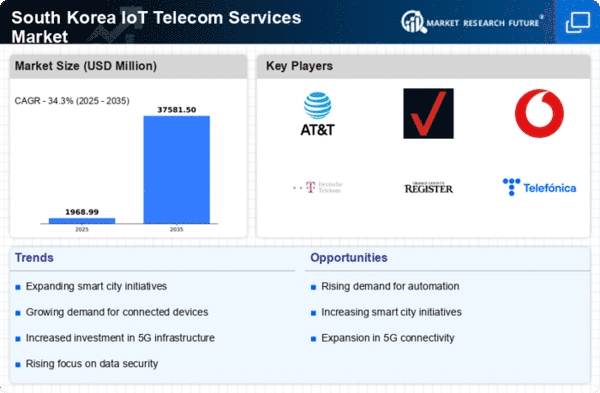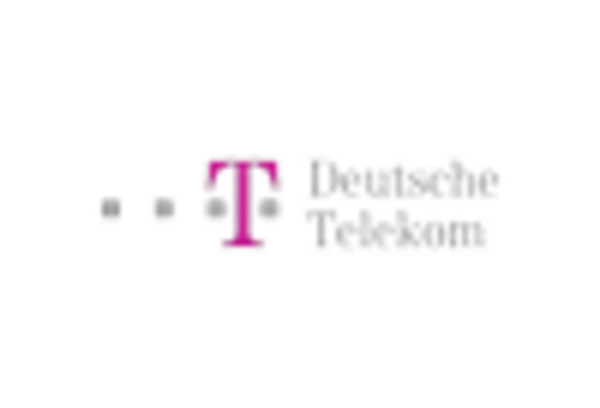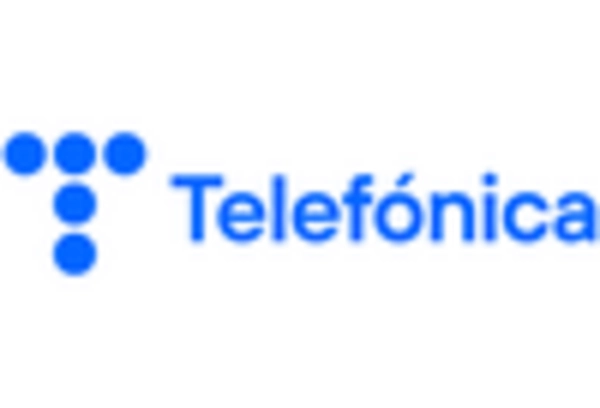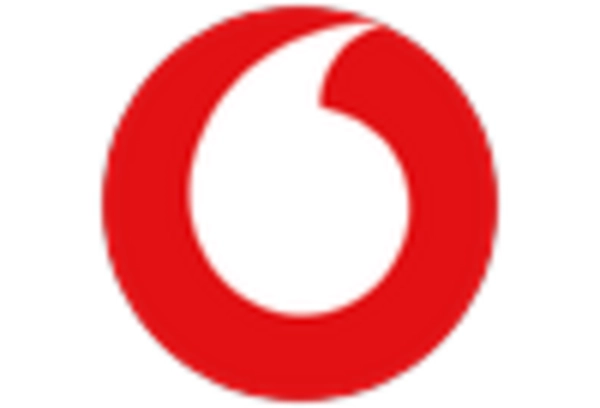Expansion of 5G Infrastructure
The rapid expansion of 5G infrastructure in South Korea is a pivotal driver for the iot telecom-services market. With the government and telecom operators investing heavily in 5G networks, the potential for enhanced connectivity and lower latency is substantial. As of 2025, approximately 80% of the population is expected to have access to 5G services, facilitating the deployment of IoT applications across various sectors. This infrastructure supports a multitude of devices, enabling real-time data processing and communication. The increased bandwidth allows for more devices to connect simultaneously, which is crucial for smart cities and industrial automation. Consequently, the growth of 5G is likely to propel the demand for IoT telecom services, as businesses and consumers alike seek to leverage the benefits of this advanced technology.
Increased Focus on Industrial IoT
The industrial sector in South Korea is increasingly adopting IoT technologies, which serves as a significant driver for the iot telecom-services market. Industries such as manufacturing, logistics, and agriculture are leveraging IoT solutions to enhance operational efficiency and reduce costs. By 2025, it is estimated that the industrial IoT market could grow by over 25%, reflecting a strong demand for connected devices and data analytics. This trend is further supported by the need for predictive maintenance and real-time monitoring, which are essential for maintaining competitive advantage. Telecom service providers are thus positioned to offer tailored solutions that meet the specific needs of various industries, fostering a symbiotic relationship that drives mutual growth.
Government Initiatives and Funding
Government initiatives and funding play a pivotal role in shaping the iot telecom-services market. The South Korean government has launched various programs aimed at promoting IoT adoption across multiple sectors, including healthcare, transportation, and agriculture. By 2025, it is anticipated that government investments in IoT-related projects could exceed $5 billion, fostering innovation and collaboration between public and private sectors. These initiatives not only provide financial support but also create a conducive regulatory environment for the growth of IoT services. As a result, telecom service providers are likely to benefit from increased demand for their offerings, as businesses seek to align with government objectives and leverage available resources to implement IoT solutions.
Rising Demand for Smart City Solutions
The burgeoning interest in smart city initiatives in South Korea significantly influences the iot telecom-services market. As urban areas become increasingly congested, local governments are investing in IoT solutions to enhance public services and improve quality of life. For instance, smart traffic management systems, waste management, and energy-efficient buildings are becoming commonplace. By 2025, it is projected that investments in smart city technologies could reach upwards of $10 billion, indicating a robust market opportunity for telecom service providers. These solutions not only optimize resource usage but also enhance citizen engagement through improved connectivity. The integration of IoT services into urban planning is likely to drive further growth in the telecom sector, as the need for reliable and scalable communication networks becomes paramount.
Consumer Demand for Enhanced Connectivity
The increasing consumer demand for enhanced connectivity is a crucial driver of the iot telecom-services market. As more households adopt smart home devices, the need for reliable and high-speed internet connections becomes essential. In South Korea, it is projected that by 2025, over 60% of households will have at least one smart device, creating a surge in demand for telecom services that can support these technologies. This trend is likely to encourage telecom providers to innovate and expand their service offerings, including bundled packages that cater to smart home ecosystems. The competitive landscape will further push providers to enhance their infrastructure, ensuring that consumers have access to seamless connectivity, which is vital for the proliferation of IoT applications.
















